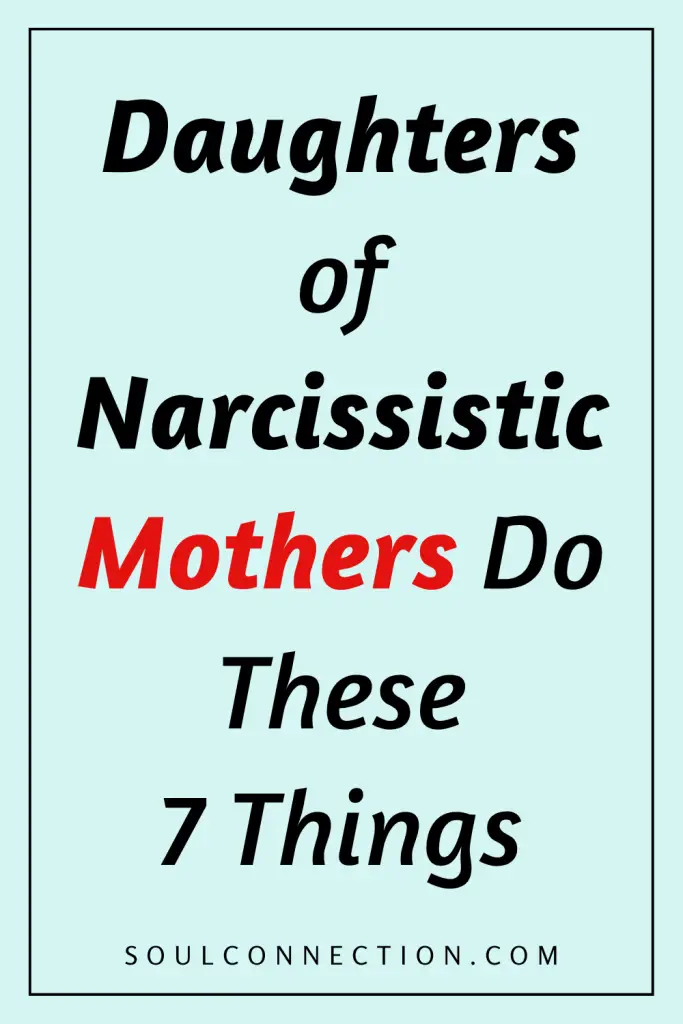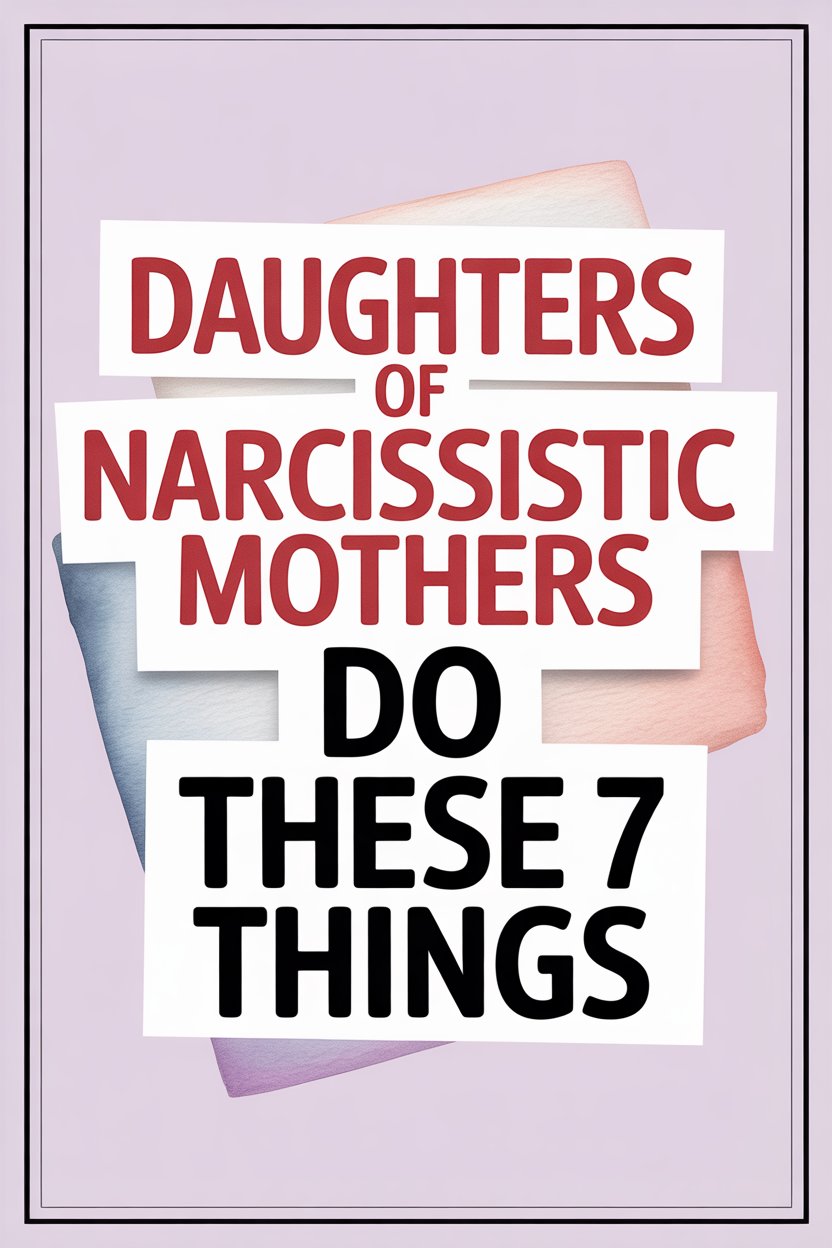It’s a universal truth that no one’s childhood is a marshmallow-stuffed fairytale. But when your mother’s love comes with a side order of manipulation and self-obsession, you end up developing certain survival skills.
Some of them are helpful. Others? About as useful as a chocolate teapot.
If you’ve ever felt like you were more of a supporting character in your own life—one whose main job was to make Mum the star—you might recognize yourself in what follows.
Let’s unpack the seven things daughters of narcissistic mothers tend to do, sometimes without even realizing it. Spoiler: you’re not alone, and you’re certainly not broken.
1. Overthink Every. Single. Thing.
Picture this: you’re standing in the snack aisle, frozen in terror over which brand of crisps to buy. Crunchy dilemma, right?
Growing up with a narcissistic mother means you probably second-guessed yourself from an early age—your opinions, feelings, even your taste in snacks.
After all, every choice was critiqued, twisted, or ignored unless it matched your mother’s preferences.
This chronic overthinking doesn’t vanish at adulthood’s doorstep. It seeps into relationships, work emails, and even what you say to the barista.
Did I sound rude? Should I have smiled more? Is it my fault if someone is in a mood?
The fix? Notice when you’re spiraling. Try to catch the thought: “Am I literally trying to predict the emotional weather around me?” Give yourself permission to pick a side—any side—without running a mental marathon.
2. Apologize for Existing
Every daughter of a narcissistic mother has at some point apologized for breathing too loudly. Or for having feelings. Or, heaven forbid, for not being delighted at Mum’s latest self-centered monologue.
The reflexive “sorry” sneaks its way into daily life like an annoying pop-up ad.
This habit can make you the world’s most considerate flatmate and probably the most apologetic person in any boardroom. It’s like you’re on an endless tour of remorse for, well, just being human.
Try this: before apologizing, pause and ask, “Did I actually do something wrong?” If not, try a different phrase, like “Thanks for letting me know,” or just—wait for it—say nothing at all. Your existence isn’t a crime.
3. Become Olympic-Grade People Pleasers
If there were gold medals for people-pleasing, daughters of narcissistic mothers would sweep the podium. Growing up, pleasing Mum wasn’t just encouraged; it was a survival tactic.
Agree with her, mirror her opinions, anticipate her moods—anything to avoid criticism or the infamous silent treatment.
As an adult, this skill goes pro. You read between the lines of every text message, you offer to do extra at work, and your friends know you’ll always say yes, even when you really want to say no.
The cost? Your own needs get buried deeper than leftovers in the back of the fridge.
Recovery starts with one word: boundaries. The next time you’re about to say yes to something you dread, buy yourself a second’s grace with “Let me check my schedule and get back to you.” No one will faint. You might even get used to it.
4. Keep Emotions Under Lock and Key
If you grew up with a mother whose emotional range ran from “I’m the victim” to “Why aren’t you making me feel better?”, chances are you learned to bottle up your own feelings.
Tears were a weakness, anger was rebellion, and joy—unless it was about her—had to be toned down.
This emotional lockdown can make it tough to identify what you’re feeling, much less express it. Relationships get trickier. How can anyone connect with your real self if your real self is buried under layers of emotional bubble wrap?
Here’s a rebellious thought: try naming your feelings, even if only in your head. “I feel sad.” “I feel angry.” “I feel like eating half a cheesecake for dinner.” You’re allowed. And if you’re feeling brave, let someone else in on what’s inside.
5. Distrust Compliments
Compliments from a narcissistic mother often come with an expiry date or a hidden catch. “You look nice today—pity about your hair.” Or the classic, “You’re smart, but don’t get cocky.”
Naturally, learning to trust praise feels like trusting a weather forecast in April. Are they being sincere? What do they want? Is this a trick?
This skepticism doesn’t vanish when you move out. If someone says, “You did a great job,” your brain starts running background checks. Maybe you downplay your achievements or deflect with a joke.
Try this as a science experiment: the next time someone offers a compliment, just say “thank you.” That’s it. No negotiation, no explanation, no “but actually.” See how that feels. (Weird at first, but pretty good after a while.)
6. Gravitate Toward Unavailable or Demanding People
Bad news: the “narcissist magnet” is real. If your blueprint for love, friendship, or authority figures was drawn by a parent who saw you as an accessory, it’s easy to mistake emotional distance or drama for “normal.”
Old habits die hard, and the gravitational pull toward difficult people is strong.
The upside? Patterns can be broken. Start noticing who energizes you versus who drains you. If a relationship feels like you’re auditioning for approval, that’s a red flag.
Hint: healthy people don’t need constant applause, and they can survive a disagreement without launching into a three-act tragedy.
When your gut says, “Uh-oh, this feels familiar (in a bad way),” trust it. Then make like a cat who’s seen a cucumber: get the heck out of there.
7. Develop a Seriously Sharp Sense of Humor
Here’s one superpower nearly every daughter of a narcissistic mother picks up: a razor-sharp sense of humor. If life’s going to serve up pain, might as well roast it with a witty comeback.
Self-deprecating jokes, perfectly timed sarcasm, and the ability to turn trauma into a stand-up routine—these aren’t just defense mechanisms, they’re survival skills.
Humor helps you connect. It lets you bond with others who “get it” and offers relief when therapy is booked solid. But even the best comedians need a break.
Sometimes, it’s okay to drop the act, even for a moment. Your feelings—yes, the not-so-funny ones—still matter.
If you catch yourself cracking jokes where you actually want comfort, try saying what you really need. It won’t kill the mood. In fact, it might deepen the connection.
Healing Doesn’t Require Perfection
If you’re ticking off every item on this list, congratulations: you probably earned a bad-ass badge in emotional gymnastics. But those patterns aren’t life sentences.
The best part? Growth doesn’t require flawless execution. Small, awkward steps count.
Changing how you relate to yourself, and to others, is a marathon—one with snack breaks, wrong turns, and a few spectacular wipeouts.
Hang around people who make you feel seen. Laugh at the absurdity of it all. And when that inner critic, trained so well by Mum, pipes up?
Remind yourself: you’re doing just fine. Maybe even better than fine.
Go ahead, pick the crisps you like. No apology necessary.


